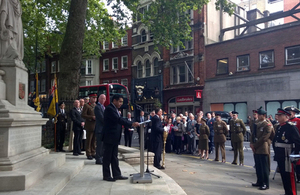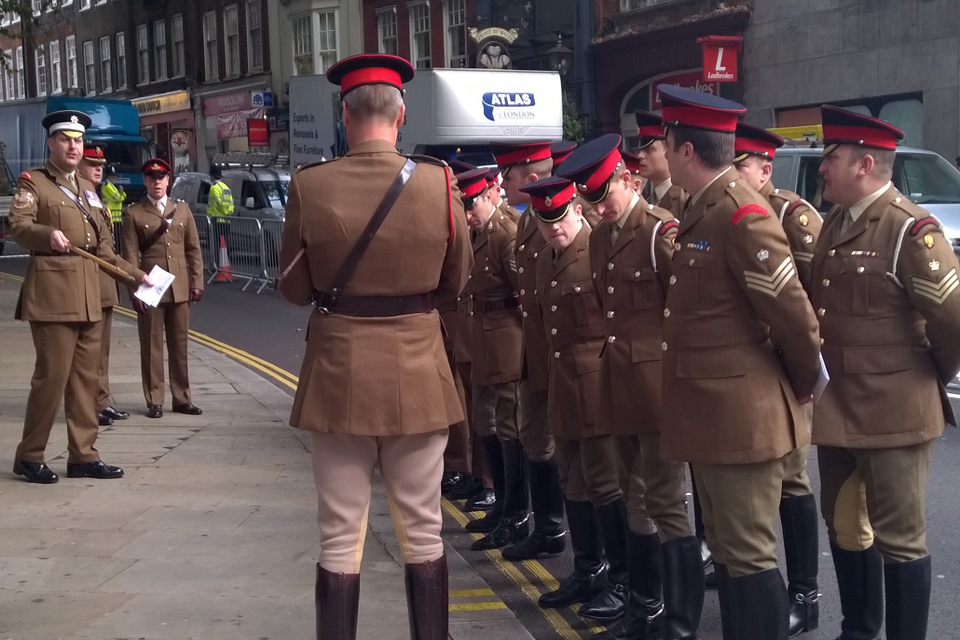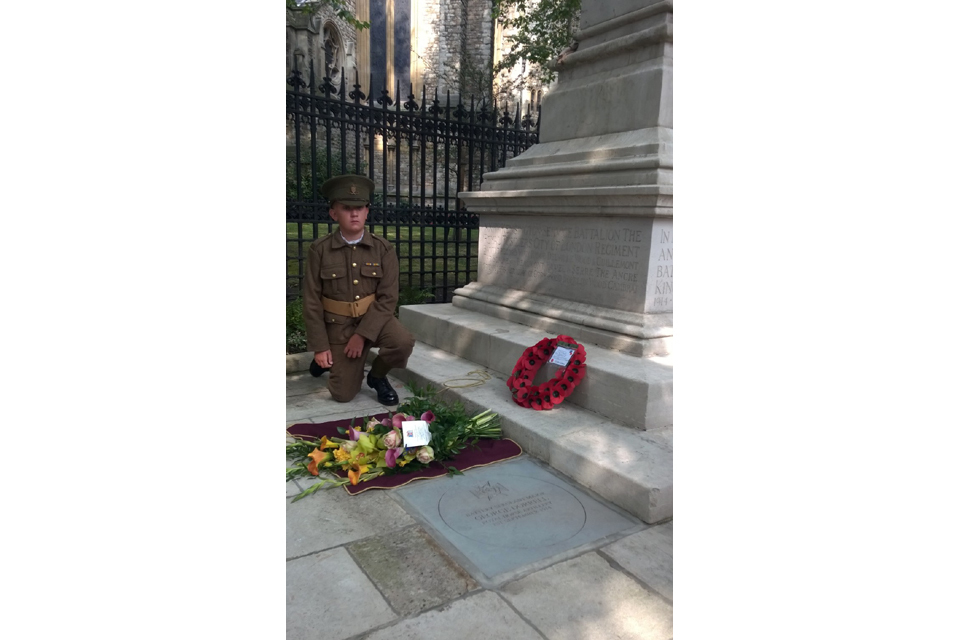Lord Ahmad pays tribute to the gallantry of Sergeant Major George Dorrell VC
Bravery of a local First World War hero honoured at Kensington.

Lord Ahmad speaking at the ceremony
Communities Minister Lord Ahmad today (5 September 2014) joined the family of Sergeant Major George Dorrell VC, members of the Royal Horse Artillery, and residents of the Royal Borough of Kensington and Chelsea to honour the bravery of a local First World War hero.
100 years ago this week, Sergeant Major George Dorrell displayed exceptional courage at the historic stand at Néry, France, for which he and 2 comrades from ‘L’ Battery Royal Horse Artilllery were awarded the Victoria Cross, Britain’s highest military honour.
Speaking at the ceremony held at Kensington War Memorial where a Victoria Cross paving stone was laid in his honour, Lord Ahmad said:
Today we have come together to say we will remember, we will never forget.
100 years on from events that shook the world, it’s vitally important that we remember these moving stories, such as the Royal Horse Artilllery’s historic stand at Néry.
In doing so, we are protecting an important part of our history for future generations, while acknowledging and appreciating the great sacrifices, gallantry and bravery of men such as George Dorrell, who put their lives at risk to protect our way of life.
Members of the Royal Horse Artillery prepare for the ceremony.

Members of the Royal Horse Artillery
The Mayor of Kensington, Maighread Condon-Simmonds, and George Dorrell’s grandson at the ceremony.

Mayor of Kensington Maighread Condon-Simmonds, and George Dorrell’s grandson
This August saw the start of the nationwide campaign to honour those who received the Victoria Cross, during the First World War. Over the next 4 years on a date corresponding or close to when they were awarded the VC, commemorative paving stones will be laid in their place of birth or where they lived following the war.
469 stones will be laid in communities in England, Wales, Scotland and Northern Ireland. The programme will also see 35 VC recipients commemorated in the Republic of Ireland. 145 stones will be laid in the National Memorial Arboretum to commemorate those born overseas.
George Dorrell was 34 years old, and a Battery Sergeant Major in the ‘L’ Battery, Royal Horse Artillery, during World War I when the following deed took place for which he was awarded the VC:
For continuing to serve a gun until all the ammunition was expended, after all officers were killed or wounded, in spite of a concentrated fire from guns and machine guns, at a range of 600 yards, at Néry on the 1 September.
A young Cadet pays tribute.

Young cadet pays tribute
On 1 September 1914, at Néry, France, during a fierce attack by the enemy, all the officers of ‘L’ Battery were either killed or wounded, including the officer (Edward Kinder Bradbury) in command, who, although having had one leg taken off by a shell, continued to direct the firing until he died. Battery Sergeant-Major Dorrell then took over command with the support of a sergeant (David Nelson) and continued to fire one of the guns until all the ammunition was expended.
The award of the Victoria Cross to George Dorrell was announced on 16 November 1914. Bradbury and Nelson were also awarded the VC, the former posthumously. In March 1915 Dorrell was commissioned into the Royal Field Artillery. He retired with the rank of major in 1921. Dorrell continued to serve with the Territorial Army, retiring in 1929 with the rank of Brevet Lieutenant Colonel. During the Second World War he served with the Home Guard. He died at Cobham, Surrey in 1971 aged 79.
Further information
Follow the laying of the commemorative stones on Twitter #VCpavingstones, and on Pinterest.
See the dates of upcoming paving stone laying ceremonies.
The decision about the site of each stone has been taken by the relevant local authority. Guidelines to local authorities encouraged them to site the stones in a location that would have had resonance with the VC recipient, such as outside a house that they lived in or near their old school. Most importantly, the stones should be part of the community and sited in a position where they will be visible to members of the public.
A public competition was held to choose a design for the paving stones and this was judged by a panel of 7 experts. The competition was won by Charlie MacKeith from London whose winning design will feature on all the paving stones that will be laid in communities across the country. The circular design seeks to ‘make one pause and remember’ and uses the material, form and lettering of the family of memorials used by the War Graves Commission.
The paving stones are made of Scoutmoor Yorkstone a hard-wearing British stone that is quarried near Ramsbottom. Each stone will include the name of the individual, the rank and regiment of the individual (at the time the VC was awarded) and the date of the action for which the VC was awarded.
Office address and general enquiries
2 Marsham StreetLondon
SW1P 4DF
Contact form https://www.gov.uk/gui...
General enquiries: please use this number if you are a member of the public 030 3444 0000
If your enquiry is related to COVID-19 please check our guidance page first before you contact us - https://www.gov.uk/guidance/coronavirus-covid-19-guidance-for-local-government.
If you still need to contact us please use the contact form above to get in touch, because of coronavirus (COVID-19). If you send it by post it will not receive a reply within normal timescale.
Media enquiries
Email newsdesk@communities.gov.uk
Please use this number if you are a journalist wishing to speak to Press Office 0303 444 1209